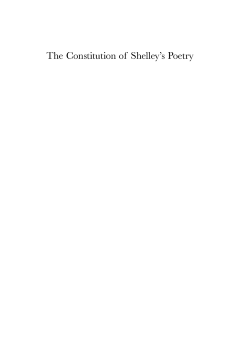
Additional Information
Book Details
Abstract
‘The Constitution of Shelley’s Poetry’ is a close philosophical reading of ‘Prometheus Unbound’ from the perspective of the argument or drama of language played out in its pages. At its heart a four-chapter reading of ‘Prometheus Unbound’, the book is punctuated with readings of other Shelley works and prefaced with two earlier chapters: one on 'Mont Blanc' and 'Hymn to Intellectual Beauty', the companion poems inaugurating Shelley’s poetic maturity; the other on 'Ode to the West Wind' originally published with ‘Prometheus Unbound’ and here represented as 'signature' Shelley. The book’s one most distinguishing feature, from which several others derive, is its bringing the power and pertinence of Stanley Cavell’s thought to Shelley’s poetry and to his explicitly articulated philosophical interest in language.
The book urges and practises close reading, but it provides philosophical grounds for this ostensibly old-fashioned approach, and it implicitly proposes an understanding of language very different from those now most generally assumed in literary studies. The book’s bringing of Cavell’s thought to Shelley’s poetry would make two related but distinguishable contributions. There is, first of all, the reading of Shelley’s poetry, which is new and persuasive both in many of its local moments and in its overall thrust. Second, there is the practical demonstration of the relevance and yield of Cavell’s thought for literary studies.
‘The Constitution of Shelley’s Poetry’ is a close philosophical reading of ‘Prometheus Unbound’ and other Shelley works from the perspective of the argument or drama of language played out in its pages. The book urges and practises close reading, but in the thought of Stanley Cavell, it finds and develops philosophical grounds for this ostensibly old-fashioned approach, and it implicitly proposes an understanding of language very different from those currently assumed in literary studies.
Edward T. Duffy is Associate Professor of English at Marquette University, Wisconsin, USA.
